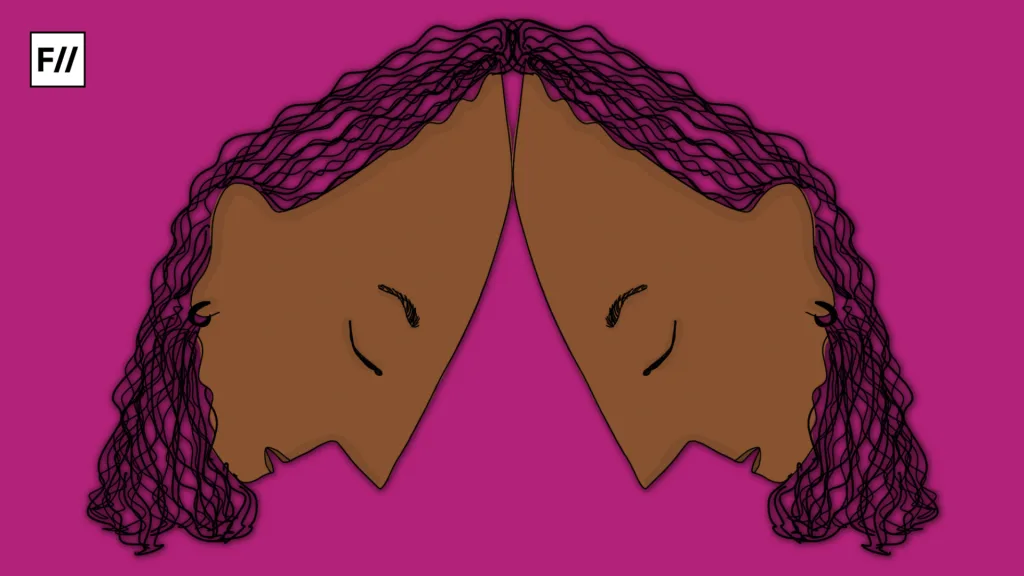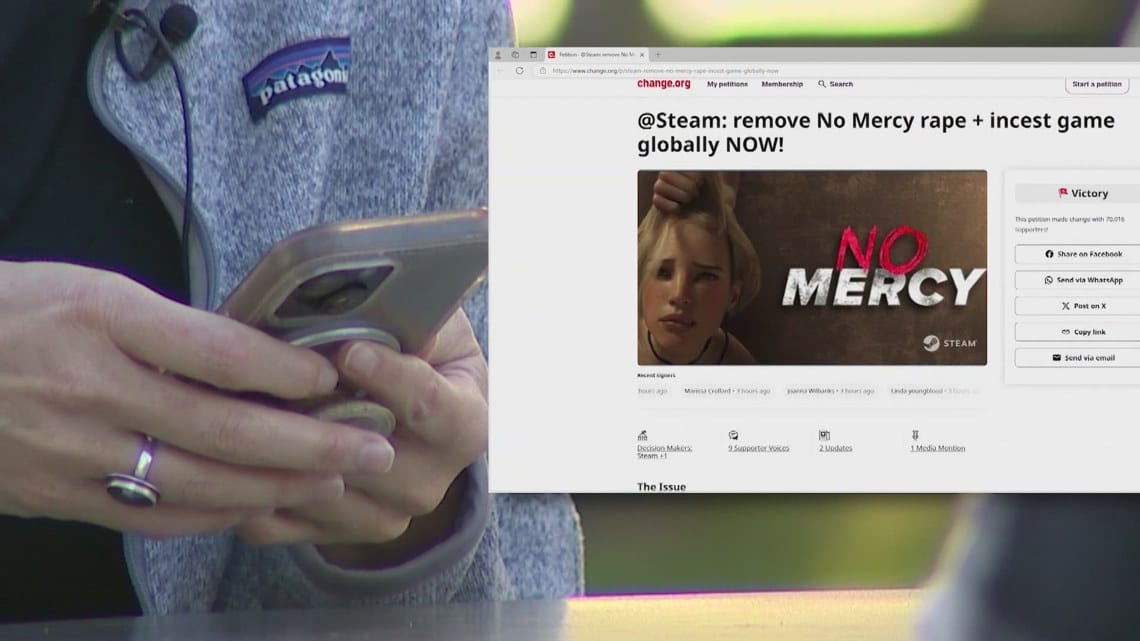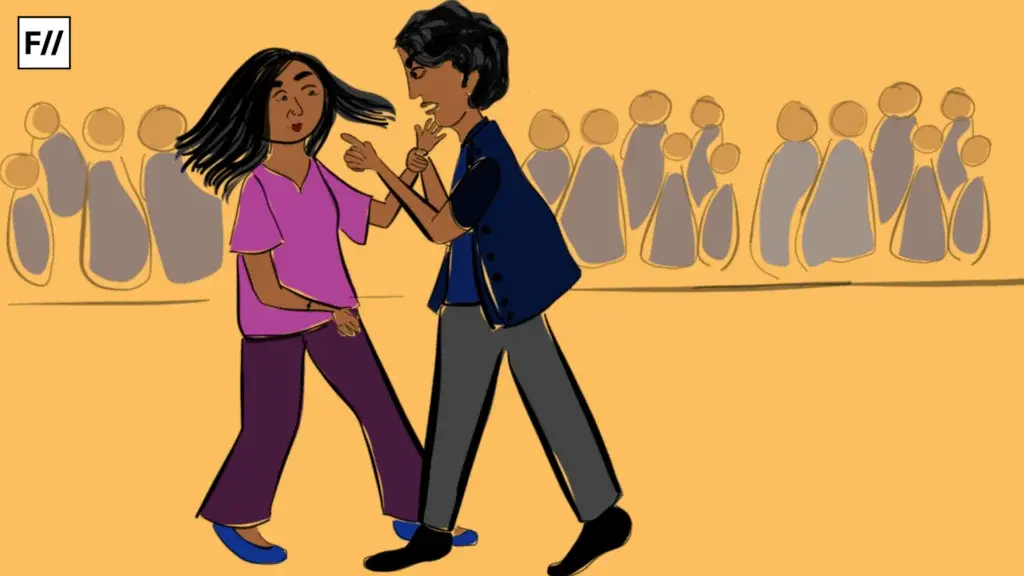TW: Mentions of sexual assault, rape, violence, genitalia, misogynistic language
In what can only be described as a deeply disturbing reflection of the global surge in toxic masculinity and gender-based violence, No Mercy—a story-based PC game centered around a male protagonist who engages in non-consensual sex and coercion—has sparked widespread online outrage.
Less than a month after its official launch, the game was taken down from the popular gaming distribution platform Steam following massive backlash. The game’s Steam page openly advertised elements like “incest,” “blackmail,” and “unavoidable non-consensual sex,” and encouraged players to become “every woman’s worst nightmare” and to “never take ‘no’ for an answer.” Critics and users have labelled the game a “rape simulator.”
Inside No Mercy
No Mercy released for PC on March 22 via Steam, Valve Corporation’s popular digital game distribution platform.
On its official website, developer Zerat Games describes No Mercy as a ‘3D choice-driven adult Visual Novel with a huge focus on Blackmail and Male Domination.’ Before being taken down from Steam, the game’s short description stated: ‘After your mother’s affair shatters your family, you take on a new role: not to fix what’s broken, but to claim her for yourself.‘
The game’s storyline is rooted in sexual violence and coercion. Players are encouraged to respond to a mother’s supposed infidelity by “claiming” her, leading to graphic scenes where the player forces women—including the protagonist’s own mother—into non-consensual sex. The game’s description on Steam includes this line: ‘Unveil her deepest secrets, subdue her, and make all women yours.’
The following text is from the game’s promotional material:
WARNING: This is NOT your average love story.
After catching your own mother betraying your father, you uncovered the true nature of women, especially her. But she’s no ordinary housewife: she’s hiding a dark secret that’s haunted her for years.
Now, it’s your turn to uncover it, blackmail her, expose her, and rebuild your family on your terms. Own her.
In this game, you’ll either become every woman’s worst nightmare… or rather: the best dick they’ll ever have. Your goal is simple: leave no pussy non-fucked, since that’s the only thing they all want. Never take ‘no’ for an answer.
Fuck your mom, fuck your auntie, and even fuck your friend’s mom. Why not?
Already a fan favorite in the NSFW Game Incest community.
Take what’s yours and show No Mercy.
Public outcry against No Mercy
Shortly after its launch on Steam, No Mercy (rightly) faced swift condemnation over its graphic portrayal of sexual violence, incest, and non-consensual sex.
Shortly after its launch on Steam, No Mercy (rightly) faced swift condemnation over its graphic portrayal of sexual violence, incest, and non-consensual sex.
On April 8, Collective Shout, a grassroots feminist movement based in Australia forced Steam to geo-block the game in Australia. A day later, on April 9, UK technology secretary Peter Kyle called No Mercy ‘deeply worrying‘ during a segment on British radio station LBC. Kyle further stated that he expects ‘every [tech company] to remove content as soon as they possibly can after being made aware of it.’

On the same day, Collective shout went on to initiate a Change.org petition urging Steam to take the game down globally. The petition gained traction rapidly, gathering over 70,000 signatures from supporters demanding its complete removal.
‘By treating rape as entertainment, No Mercy puts all women and girls at risk,’ the petition stated. It further criticised the game for normalising sexual violence, stating that ‘the promotion of rape and incest—along with the suggestion that women deserve or desire such abuse—reinforces dangerous narratives that contribute to real-world violence against women.‘
In response to the mounting pressure, Zerat Games has pulled the game from Steam entirely, though not before defending the game’s content. In their public statement, the developers said that the game has been misrepresented in online videos with ‘graphics from a completely different game,’ but acknowledged that No Mercy depicts behavior that is “disgusting” in the real world. The creator asserted, however, that incest, blackmail, and “male domination” are common kinks that don’t reflect on the character of those who seek them out in a fictional, roleplay context, and don’t cause social or psychological harm.
Denial, delusion and dangerous defenses: the case of No Mercy
Whether or not No Mercy warrants a complete ban is a separate discussion. What urgently calls for attention is the overwhelming support the game has received from the online world—largely from men—many of whom have dismissed the widespread backlash as an “overreaction.”
Since its launch, the game has garnered overwhelmingly positive reviews on Steam. Online, an alarming number of users have not only defended the game but ridiculed, dismissed and even threatened those calling for its removal.
Since its launch, the game has garnered overwhelmingly positive reviews on Steam. Online, an alarming number of users have not only defended the game but ridiculed, dismissed and even threatened those calling for its removal. The backlash to the backlash, so to speak, has revealed just how deeply normalised certain attitudes around violence and misogyny remain.
‘This is a blow to free speech,’ one user posted on X, framing the game’s removal as a form of censorship. Another wrote: ‘Streisand Effect. I’m definitely gonna support this game now,‘ using the controversy as motivation to amplify the game rather than question its content.
Many have tried to minimise the issue altogether, claiming that a tendency to commit crimes in a virtual world rarely translates to real-world contexts: ‘It’s a game, it’s not real,‘ one user posted. This argument falls apart rather quickly when juxtaposed with some other responses.
Take, for instance, this: ‘Relax, you’re all a bunch of frumpy, probably obese losers. Nobody would want to rape you.‘ Or this, even more disturbing: ‘Raping your mom and sister is fun.‘
Collective Shout reported receiving a wave of backlash after speaking out—the comments ranging from wildly irrational to outrightly harmful.
The game, and the response its removal has triggered, only reiterates the culture it reflects: one that not only normalises but often glorifies violence against women. This isn’t just about one visual novel. It’s about the comfort with which misogyny is cloaked in “free speech,” the cruelty of online discourse, and an online community where empathy is often met with ridicule.
Where do we draw the line?
In a climate marked by rising violence against women and a growing lack of accountability among tech platforms especially in relation to content, Valve Corporation’s decision to host No Mercy is deeply troubling and sets a dangerous precedent. This is particularly concerning given that psychological studies suggest a positive correlation between exposure to violent video games and aggression in real-world contexts.
This is particularly concerning given that psychological studies suggest a positive correlation between exposure to violent video games and aggression in real-world contexts.
This incident reinforces the importance of holding platforms accountable for the content they distribute, especially when it perpetuates harmful narratives and behaviors.
About the author(s)
Adithya (he/him/his) is a political consultant specializing in research and communications, currently on a ‘strategic sabbatical’ to pursue his passion for writing. Beyond engaging in political debates, he is drawn to reading and film, especially works that challenge the status quo. He has a particular affinity for works on feminism, geopolitics, and history.







